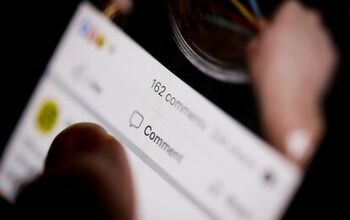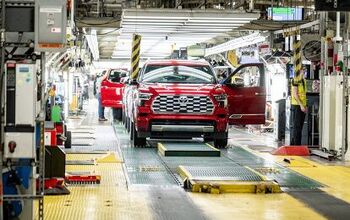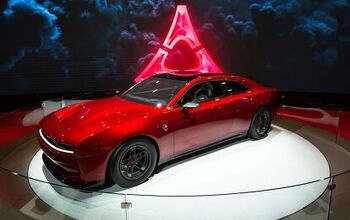Anti-Iran Pressure Group Takes Hyundai Off Axis Of Evil Black List, Keeps GM And Chrysler On

Car companies severing ties with Iran are making headlines. After GM’s new partner PSA decided to stop sending parts to Iran, Hyundai “has quietly ended its business dealings with Iran, where it had extensive operations,” says the New York Times. The Times chalks this up as a win for “United Against Nuclear Iran, an American group that has advocated economic sanctions.” UANI keeps a list of companies that still do business with Iran, it also lists companies that have withdrawn from doing so. Hyundai has received a check mark in the “withdrawn” list.
Detroit is looking nervously at that list. Let’s have a look as well.
The UANI list is a veritable who’s who of the auto business. Just about anybody who is somebody is listed as having ties to the unshaven part of the axis of evil. Interestingly and coincidentally, the two American car companies that were saved by the U.S. Government are listed as still dealing with the enemy: Chrysler and General Motors. The company that was not bailed out, Ford, is not on the list of Iran-collaborateurs.
No longer doing business with IranHyundai Motor CompanySouth KoreaKarsan OtomotivTurkeyStill doing business with IranAntonov Co.UkraineBMWGermanyBridgestone CorporationJapanCarl Schenck AGGermanyChana Auto Co.ChinaCheryChinaChryslerUSACitroenFranceDaimlerGermanyDurr AGGermanyFiat S.p.A.ItalyGeneral MotorsUSAHoegh AutolinersNorwayHonda Motor Co.JapanIsuzuJapanIvecoItalyKamazRussiaKia MotorsSouth KoreaLifan Industry Group Co.ChinaMazdaJapanMercedes-BenzGermanyMitsubishiJapanNissanJapanPeugeotFrancePorsche AGGermanyProton Holdings BhdMalaysiaRenaultFranceSubaruJapanSuzukiJapanToyota Motor CorporationJapanValeoFranceVenirauto Industrias CAVenezuelaVolkswagenGermanyVolvoSwedenTTAC simply reprints the list as compiled by the UANI. Their list, not ours. We make no representations as to its correctness. PSA, which says it has withdrawn from doing business with Teheran, is still listed as consorting with the enemy (as “Citroen,” and again as “Peugeot”). So is Toyota, which had announced its pull-out from Iran two years ago.
It should be noted that doing business with entities in Iran is not illegal per se. There is a European embargo against Iranian oil. The U.S. has imposed sanctions on Iranian imports, and on some export to Iran. Companies wanting to do business with Iran need a license from the Department of Treasury. Doing business with Iran has become increasingly complicated after Iranian banks were disconnected from international payment systems.
Because it is not illegal to do business with Iran, the UANI pressure group wants to make companies decide between business with Iran and business with the U.S. government. United Against Nuclear Iran is proposing legislation that denies U.S. government contracts to “automotive entities” that do not sever ties with Iran.
If passed, this law could become costly for General Motors. On the UANI website, GM is listed as having nearly $2.9 billion worth of U.S. government business.
Yesterday, the UANI started leaning on Nissan, supplier on NYC’s “Taxi of Tomorrow.” When will the true recipients of government largesse, Chrysler and GM, be in the crosshairs of the anti-Iranian nuke campaigners?

Bertel Schmitt comes back to journalism after taking a 35 year break in advertising and marketing. He ran and owned advertising agencies in Duesseldorf, Germany, and New York City. Volkswagen A.G. was Bertel's most important corporate account. Schmitt's advertising and marketing career touched many corners of the industry with a special focus on automotive products and services. Since 2004, he lives in Japan and China with his wife <a href="http://www.tomokoandbertel.com"> Tomoko </a>. Bertel Schmitt is a founding board member of the <a href="http://www.offshoresuperseries.com"> Offshore Super Series </a>, an American offshore powerboat racing organization. He is co-owner of the racing team Typhoon.
More by Bertel Schmitt
Latest Car Reviews
Read moreLatest Product Reviews
Read moreRecent Comments
- Jeff Self driving cars are not ready for prime time.
- Lichtronamo Watch as the non-us based automakers shift more production to Mexico in the future.
- 28-Cars-Later " Electrek recently dug around in Tesla’s online parts catalog and found that the windshield costs a whopping $1,900 to replace.To be fair, that’s around what a Mercedes S-Class or Rivian windshield costs, but the Tesla’s glass is unique because of its shape. It’s also worth noting that most insurance plans have glass replacement options that can make the repair a low- or zero-cost issue. "Now I understand why my insurance is so high despite no claims for years and about 7,500 annual miles between three cars.
- AMcA My theory is that that when the Big 3 gave away the store to the UAW in the last contract, there was a side deal in which the UAW promised to go after the non-organized transplant plants. Even the UAW understands that if the wage differential gets too high it's gonna kill the golden goose.
- MKizzy Why else does range matter? Because in the EV advocate's dream scenario of a post-ICE future, the average multi-car household will find itself with more EVs in their garages and driveways than places to plug them in or the capacity to charge then all at once without significant electrical upgrades. Unless each vehicle has enough range to allow for multiple days without plugging in, fighting over charging access in multi-EV households will be right up there with finances for causes of domestic strife.


































Comments
Join the conversation
It would be nice that those guys explain what kind of business does GM and Chrysler have with Iran, other than their relationships with Fiat Group and PSA. In any case, instead of weakening the country, what this sanctions ultimately will achieve is reinforce their resilience.
Yes it's all true! you have focused on the point!